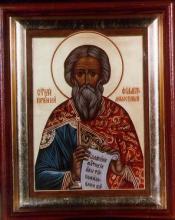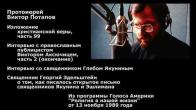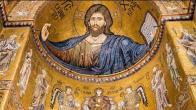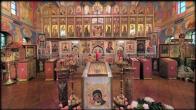You are here
Righteous Philaret the Merciful of Amnia in Asia Minor
1/14 December
 Blessed are the merciful: for they shall obtain mercy (Matthew 5:7) said our Lord Jesus Christ. This was realized in the righteous Philaret the Merciful, who, for his great mercy toward the destitute, received from God a great recompense in this earthly life and in the next as his blessed life testifies.
Blessed are the merciful: for they shall obtain mercy (Matthew 5:7) said our Lord Jesus Christ. This was realized in the righteous Philaret the Merciful, who, for his great mercy toward the destitute, received from God a great recompense in this earthly life and in the next as his blessed life testifies.
Philaret lived in the eighth century in the village of Amneia in the Asia Minor province of Paphlagonia. His wife, Theosevo, was from a rich and distinguished family, and they had children: A son, John, and two daughters, Hypatia and Evanthia.
Philaret was a rich grandee, but his wealth did not gladden him. Knowing that many people suffer from poverty, he sympathized with them and in compunction said to himself: "Have I really received so many good things from the hand of the Lord only in order to feed myself alone and to live in pleasures, pleasing my belly? Ought I not share the great wealth given to me by God with the destitute, the widows, the orphans, the wanderers and the beggars, whom the Lord, at the Dread Judgment before angels and men, will not be ashamed to call His brethren, since He has said: Inasmuch as ye have done it unto one of the least of these my brethren, ye have done it unto me (Matthew 25:40). And what benefit will all my possessions bring to me at the Dread Judgment if I, in my miserliness, preserve them for myself alone, for, at that Judgment, those who did not show mercy will not receive mercy. Will my possessions be immortal food and drink for me in the life to come? Will my soft garments serve as incorruptible raiment for me there? No, this will not be! For thus says the Apostle: For we brought nothing into this world, and it is certain we can carry nothing out (I Timothy 6:7). And so, if we cannot take hence any of our earthly belongings with us, then it is far better to give them to God, as if on loan, by the hands of the destitute; for God will never abandon either me, or my wife, or my children. The Prophet David assures me of this, saying: I have been young, and now indeed I am old, and I have not seen the righteous man forsaken, nor his seed begging bread" (Psalm 36:25). And Philaret was renowned for his love of the poor.
Once, the Arabs fell upon the province in which Philaret's family lived; they laid waste the country and plundered his property. All he had left were two oxen, a cow, a few beehives and a house. But even this, the last, he gradually distributed to the poor. He steadfastly and meekly bore the reproaches of his wife and the ridicule of his children. "I have in caches unknown to you such wealth and such treasures," he replied to his kin, "which will suffice you, even if you should live a hundred years without laboring or worrying about anything".
And the Lord rewarded Philaret for his mercy: When the last measure of wheat was given away, his old friend sent forty measures to him; and after that, when his warm clothing was given away to a destitute man, his wealth returned to him.
At that time, the Byzantine Empress Irene (780802) was seeking a bride for her son her coruler Constantine Porphyrogenitus (780797) and for this she sent emissaries throughout the whole Empire. The emissaries did not pass by the province in which Philaret lived. When Philaret and Theosevo learned that very eminent guests were to visit their home as well, Philaret rejoiced greatly, but Theosevo was saddened: there was no food at all in the house, and as far as fitting fare was concerned, this was out of the question. But Philaret ordered his wife to clean the house well. The neighbors, having learned that royal emissaries were expected, brought everything for a rich banquet in abundance. The emissaries picked Philaret's granddaughter, Maria, for the royal inspection, along with ten most beautiful maidens. Maria surpassed her rivals in goodness and modesty and became Empress, and Constantine Porphyrogenitus gave generous gifts to Philaret. Thus, glory and wealth returned to Philaret. But, as before, the holy lover of the poor generously distributed alms and organized meals for the destitute, and he himself served them during these meals. Everyone marveled at Philaret's humility and said: "Truly, this man is wholly of God, a true disciple of Christ".
He ordered his servant to make three boxes and to fill them with coins one with gold, one with silver and one with copper. From the first, the totally indigent received alms, from the second those deprived of means, and from the third those who hypocritically wheedled money.
Thus, not accepting honors, in humility and love for the poor, the blessed elder attained ninety years of age. Seeing his end beforehand, he departed for the Constantinopolitan Convent of Rodolphia and distributed everything there that he had with him on the needs of the convent and the destitute. Having called his kin, Philaret instructed them, saying in particular: "Do not hold fleeting wealth dear, but send it thither, whither I am departing now. Do not leave your possessions here, lest strangers or enemies who hate you make use of them. Do not forget hospitality. Defend the widows, help the orphans, visit the sick and those held in prisons. Do not shun communion with the Church, do not steal another's goods, do not offend anyone, do not speak evil, do not rejoice at the afflictions and calamities even of enemies".
The holy, righteous Philaret died in the year 792 in the Rodolphia Convent of the Judgment in Constantinople.
* * *
Such was Saint Philaret. What conclusions can we draw for ourselves from his life? In The Prologue in Lessons such conclusions are called to our attention.
"…The account about Philaret gives a lesson to the miserly, who think that if they help the poor, they will come to ruin.; and therefore, they are not touched either by tears, or by the entreaties of widows and orphans, but they keep vicious dogs so that the poor will not darken their door. Wealth, as is seen from the life of Philaret, does not hinder mercy, just as mercy does not hinder wealth.
"The account about Philaret gives another lesson to those enduring misfortune apparently without reason, so that they would not despair, but place their hope in God. (...) Let those enduring misfortune through no fault of their own remember that the Lord will not allow them to be tempted beyond what they are able to bear, and will turn their misfortune to happiness and their sorrow to gladness.
"The next lesson the account about Philaret gives is to those in good fortune, so that they would not become conceited and not turn their face from the unfortunate. Philaret was merciful both when he was rich and when he was poor; and when he became the royal grandfather he also, as was his custom, gave mercy to those who needed it."
* * *
It is difficult to live as Saint Philaret the Merciful lived. We are too tied to what is earthly and with great difficulty do we part with it. But if each of us would realize his Christian responsibility before God and neighbor especially toward the needy and would take part in our parish's philanthropic activities, we could realize truly great acts of good. The main thing here is to understand one's responsibility for the state of the world around us, not only in thought, but also in deed.
Perhaps the following thoughts of Saint Simeon the New Theologian will inspire us in this struggle.
Relics in cathedral - monthly calendar
| S | M | T | W | T | F | S |
|---|---|---|---|---|---|---|
|
|
|
|
1
|
2
|
3
|
4
|
|
5
|
6
|
7
|
8
|
9
|
10
|
11
|
|
12
|
13
|
14
|
15
|
16
|
17
|
18
|
|
19
|
20
|
21
|
22
|
23
|
24
|
25
|
|
26
|
27
|
28
|
29
|
30
|
31
|
|
PARISH LIFE
Address of our Cathedral
While all the materials on this site are copyrighted, you may use them freely as long as you treat them
with respect and provide attribution on the Russian Orthodox Cathedral of St.John the Baptist of Washington DC.









